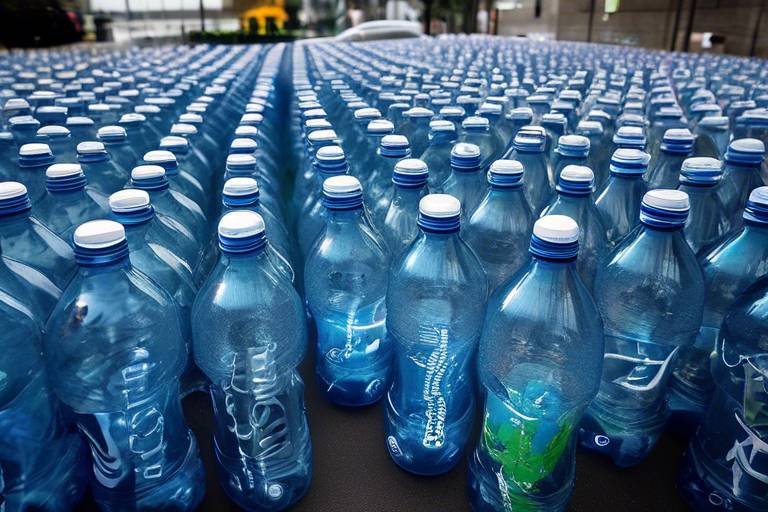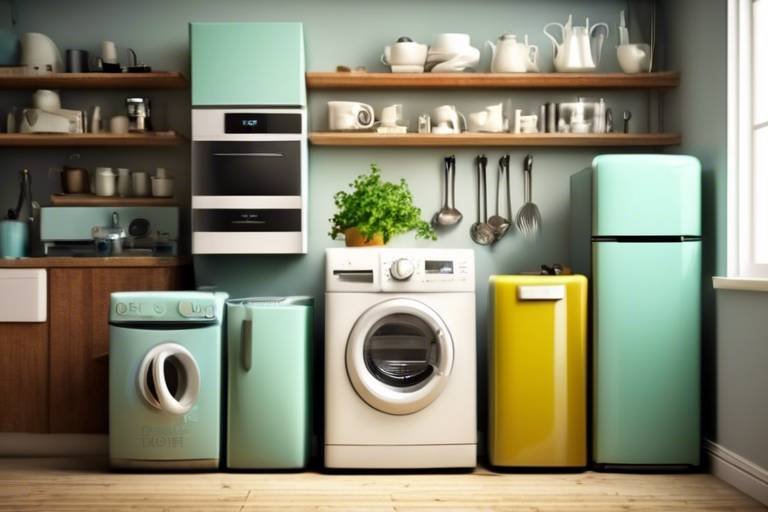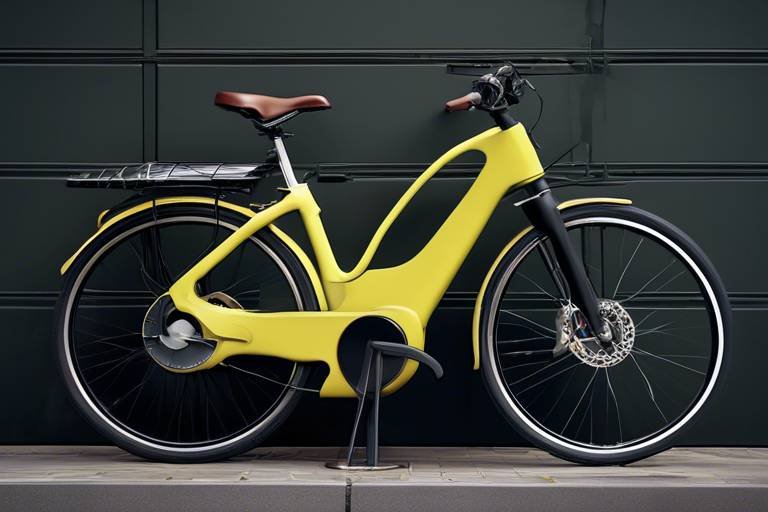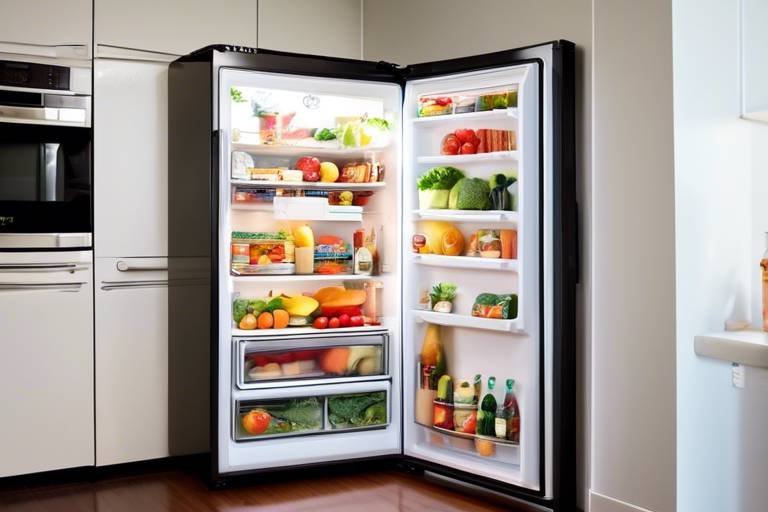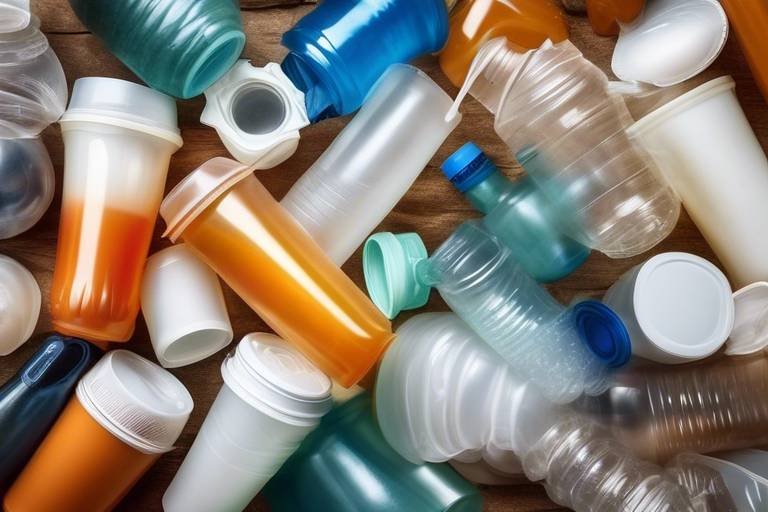What are the Sustainable Alternatives to Plastic Water Bottles?
In today's world, the fight against plastic pollution is more important than ever. With millions of plastic water bottles ending up in landfills and oceans every year, it's crucial to explore sustainable alternatives that not only reduce waste but also promote a healthier planet. This article dives deep into various eco-friendly options to plastic water bottles, highlighting their benefits, availability, and overall impact on the environment. By making small changes in our daily habits, we can collectively contribute to a greener future. So, what are these alternatives, and how can they help us in our quest for sustainability? Let’s find out!
When it comes to durability and style, stainless steel bottles take the crown. These bottles are not just tough; they are also insulated, which means they keep your drinks hot or cold for hours. Imagine sipping on a hot coffee during your morning commute or enjoying ice-cold water on a scorching summer day. Sounds appealing, right? For eco-conscious consumers, these bottles are a fantastic choice to cut down on single-use plastic waste. Plus, many brands offer sleek designs and vibrant colors, making it easy to find one that suits your personality. Why not invest in a reusable stainless steel bottle and make a fashion statement while saving the planet?
If you’re looking for a non-toxic and recyclable alternative, glass bottles might be your best bet. These beauties offer a purity of taste that plastic simply can't match. Have you ever noticed how water tastes different when stored in plastic? That’s because plastic can leach harmful chemicals into your drink. With glass, you can enjoy your beverages without worrying about toxins. Furthermore, glass is 100% recyclable, making it an environmentally friendly option. Just remember to handle them with care, as they can break easily. But hey, isn’t it worth it for the sake of your health and the planet?
For those who appreciate aesthetics along with sustainability, bamboo bottles offer a unique touch. Made from a renewable resource, these biodegradable bottles not only look great but also reduce reliance on plastic. Imagine sipping your favorite drink from a bottle that smells like nature! Bamboo is a fast-growing plant, making it a highly sustainable option. Plus, using bamboo promotes environmental responsibility and showcases your commitment to eco-friendly choices. So, if you want to stand out while being kind to the Earth, consider a bamboo water bottle.
Have you ever thought about turning waste into something wonderful? Coconut shell water bottles do just that! Crafted from discarded coconut shells, these eco-friendly options are not only creative but also promote a circular economy. By utilizing waste materials, they help reduce environmental impact while giving you a stylish way to stay hydrated. Plus, each bottle has its own unique design, making it a conversation starter. Why not embrace this innovative approach and carry a piece of nature with you wherever you go?
Travelers rejoice! Collapsible silicone bottles are here to save the day. These lightweight and flexible bottles are perfect for those on the go. Their collapsible design allows you to save space in your bag, making them ideal for hiking, camping, or even just a day out. You can easily stash them away when they’re not in use, and when you need them, they pop right back up. With silicone being reusable and durable, you can minimize your plastic use without sacrificing convenience. Isn’t it time to pack smarter and greener?
Introducing the future of hydration: plant-based biodegradable bottles. These innovative creations are made from plant materials and are designed to break down naturally over time. They offer a sustainable alternative without sacrificing convenience or functionality. Unlike traditional plastic bottles that can take hundreds of years to decompose, these bottles are eco-friendly and can return to the earth in just a few months. By choosing plant-based options, you’re not just quenching your thirst; you’re also making a positive impact on the environment.
Why rely on bottled water when you can invest in a water purification system? These systems allow individuals to refill reusable bottles with clean water from various sources, eliminating the need for single-use plastic bottles altogether. Imagine having access to fresh, filtered water right from your tap! Not only does this save money, but it also significantly reduces plastic waste. Plus, you can customize your hydration habits to suit your lifestyle. It’s a win-win for your wallet and the planet!
Have you ever noticed how convenient it is to find a water fountain when you’re out and about? Increasing the availability of community water refill stations encourages people to bring their reusable bottles, making it easier to reduce plastic waste. These stations not only provide clean drinking water but also foster a culture of sustainability. Imagine walking through a park and spotting a refill station, ready to quench your thirst while doing your part for the environment. By supporting these initiatives, we can create a community that values and practices sustainability.
Knowledge is power! Raising awareness about the environmental impact of plastic bottles is crucial. Educational initiatives can inspire individuals to make sustainable choices and adopt alternatives to plastic water bottles. By sharing information about the benefits of these eco-friendly options, we can motivate others to join the movement. Whether it’s through social media campaigns, workshops, or community events, spreading the word can create a ripple effect, encouraging more people to ditch plastic for good. Are you ready to be part of this change?
- What is the best alternative to plastic water bottles? It depends on your lifestyle, but reusable stainless steel and glass bottles are popular choices for their durability and safety.
- Are bamboo water bottles safe? Yes, bamboo bottles are safe and biodegradable, making them a great eco-friendly option.
- How do I clean my reusable water bottle? Most reusable bottles can be cleaned with soap and water, and some are even dishwasher safe. Always check the manufacturer's instructions!
- Can plant-based bottles really decompose? Yes, plant-based biodegradable bottles are designed to break down naturally over time, unlike traditional plastics.

Reusable Stainless Steel Bottles
This article explores various eco-friendly options to plastic water bottles, highlighting their benefits, availability, and impact on the environment. Discover how these alternatives can help reduce plastic waste and promote sustainability.
When it comes to making a conscious choice for the environment, stand out as a top contender. These bottles are not just a trend; they are a lifestyle choice for those who are serious about reducing their carbon footprint. Imagine sipping your favorite beverage, knowing that you’re doing your part to protect the planet! Stainless steel bottles are incredibly durable, meaning they can withstand the test of time and the occasional drop without a dent. Unlike plastic, which can crack and degrade, these bottles are built to last, making them a smart investment.
One of the most appealing features of stainless steel bottles is their insulation capabilities. Many come with double-wall vacuum insulation, which keeps your drinks hot or cold for hours. Whether you’re hiking in the mountains or commuting to work, you can enjoy a refreshing sip of ice-cold water or a hot cup of coffee. This functionality makes them not only practical but also a stylish accessory that can complement any outfit.
Moreover, stainless steel bottles are non-toxic and free from harmful chemicals like BPA, which are often found in plastic bottles. This means you can hydrate without worrying about leaching chemicals into your drink. Plus, they are easy to clean—most are dishwasher safe, ensuring that your bottle remains hygienic and ready for your next adventure.
As for availability, you can find stainless steel bottles in various sizes, colors, and designs. Whether you prefer a sleek minimalist look or a vibrant pattern, there’s a bottle out there that matches your personal style. Many brands even offer customizable options, allowing you to add your name or a favorite quote, making your bottle uniquely yours.
Another significant advantage of using stainless steel bottles is their positive impact on the environment. By choosing to refill rather than buy single-use plastic bottles, you’re contributing to a reduction in plastic waste. According to recent studies, millions of plastic bottles end up in landfills every year, taking hundreds of years to decompose. With stainless steel, you’re not just making a choice for yourself; you’re making a choice for future generations.
In summary, reusable stainless steel bottles are a fantastic alternative to plastic. They are durable, insulated, non-toxic, and environmentally friendly. So, why not make the switch today? Your body and the planet will thank you!
Here are some common questions regarding reusable stainless steel bottles:
- Are stainless steel bottles safe? Yes, they are safe and free from harmful chemicals found in plastic.
- Can I put hot liquids in a stainless steel bottle? Absolutely! Many stainless steel bottles are designed to keep hot liquids hot for several hours.
- How do I clean my stainless steel bottle? Most stainless steel bottles are dishwasher safe, but you can also wash them with warm soapy water.
- Do stainless steel bottles retain flavors? No, they do not retain flavors, making them perfect for switching between different beverages.

Glass Water Bottles
When it comes to choosing a sustainable alternative to plastic water bottles, shine brightly in the eco-friendly arena. These bottles are not only beautiful but also serve as a reliable option for those who prioritize health and environmental impact. Made from natural materials, glass bottles are free from harmful chemicals such as BPA, which are often found in plastic. This means that when you sip from a glass bottle, you’re enjoying pure, untainted water, enhancing your drinking experience.
One of the standout features of glass water bottles is their recyclability. Unlike plastic, which can take hundreds of years to decompose, glass can be recycled indefinitely without losing its quality. This makes it a fantastic choice for those who are environmentally conscious. Imagine a world where every glass bottle is recycled and transformed into something new, rather than ending up in a landfill. It’s a beautiful thought, isn’t it?
Moreover, glass bottles come in various designs and sizes, catering to different preferences. Whether you’re looking for a sleek, minimalist design to fit into your gym bag or a vibrant, artistic bottle to showcase your personality, there’s a glass bottle out there for everyone. Many brands even offer insulated glass bottles, which keep your drinks cold or hot for extended periods. So, if you’re a fan of iced tea on a hot day or a warm beverage during winter, these insulated options are perfect for you.
Let’s not forget about the taste. Many users report that water tastes better when stored in glass rather than plastic. This is because glass is non-porous and doesn’t absorb flavors or odors. So, if you’ve ever taken a sip of water from a plastic bottle and thought it tasted a bit off, you’re not alone! With glass, you can enjoy the crisp, clean taste of water without any aftertaste.
However, it’s important to note that while glass bottles are fantastic, they do come with some considerations. They can be heavier than plastic, which might be a factor if you’re on the go. Additionally, they can break if dropped, so it’s wise to handle them with care. But fear not! Many brands now offer protective silicone sleeves that can help prevent breakage while adding a pop of color to your bottle.
In summary, glass water bottles are a remarkable alternative to plastic. They provide a safe, stylish, and sustainable way to stay hydrated while making a positive impact on the environment. By choosing glass, you’re not just opting for a product; you’re embracing a lifestyle that values health, sustainability, and responsibility. So why not make the switch today? Your body and the planet will thank you!
- Are glass water bottles safe? Yes, glass water bottles are safe as they do not leach harmful chemicals into your beverages.
- Can glass bottles break easily? While glass can break, many brands offer protective sleeves to minimize the risk of breakage.
- How do I clean my glass water bottle? Glass bottles can be easily cleaned with warm soapy water or placed in the dishwasher if they are dishwasher-safe.
- Are glass water bottles reusable? Absolutely! Glass bottles are designed for repeated use, making them an eco-friendly choice.

Bamboo Water Bottles
Bamboo water bottles are not just a trend; they represent a significant shift towards sustainability in our daily lives. Made from a renewable resource, bamboo is known for its rapid growth and minimal environmental impact, making it an ideal material for eco-conscious consumers. Imagine sipping your favorite beverage from a bottle that not only looks stylish but also tells a story of sustainability. Bamboo bottles are biodegradable, which means they break down naturally over time, unlike plastic which can linger in landfills for centuries. This unique characteristic makes bamboo an excellent choice for those looking to reduce their carbon footprint.
One of the most appealing aspects of bamboo water bottles is their distinctive aesthetic. Each bottle has its own unique grain and finish, making them not just functional but also a fashion statement. They often come with a stainless steel or glass interior, ensuring that your drinks remain pure and free from any leaching chemicals. This combination of materials not only enhances the durability of the bottle but also provides an added layer of insulation, keeping your drinks hot or cold for extended periods.
When it comes to usability, bamboo bottles are incredibly versatile. They can be used for a variety of beverages, from water to smoothies, and even hot drinks like tea or coffee. Moreover, they are lightweight and easy to carry, making them perfect for outdoor adventures, gym sessions, or even just a day at the office. The ergonomic design of many bamboo bottles ensures a comfortable grip, allowing you to hydrate with ease.
However, it's essential to care for your bamboo bottle properly to ensure its longevity. Here are some tips:
- Hand Wash Only: Avoid putting bamboo bottles in the dishwasher, as this can damage the material.
- Avoid Soaking: Clean your bottle with a damp cloth rather than soaking it in water.
- Store Properly: Keep it in a cool, dry place to prevent mold and maintain its integrity.
As we navigate through a world increasingly burdened by plastic waste, bamboo water bottles stand out as a beacon of hope. They not only provide a practical solution to hydration but also promote a culture of sustainability. By opting for bamboo, you're making a conscious choice to support environmentally friendly practices and reduce reliance on plastic. So, the next time you reach for a bottle, consider one made from bamboo and join the movement towards a greener planet.
1. Are bamboo water bottles safe for hot liquids?
Yes, most bamboo water bottles have a stainless steel or glass interior that can safely hold hot liquids without leaking harmful chemicals.
2. How long do bamboo water bottles last?
With proper care, bamboo water bottles can last for several years. Regular maintenance will help extend their lifespan.
3. Can bamboo bottles be recycled?
While the bamboo itself is biodegradable, the metal or glass components may need to be recycled separately according to local guidelines.
4. Are bamboo bottles eco-friendly?
Absolutely! Bamboo is a renewable resource that grows quickly and has a minimal environmental impact, making it a sustainable choice.

Coconut Shell Water Bottles
Coconut shell water bottles are not just an eco-friendly alternative to plastic; they represent a fascinating blend of sustainability and creativity. Crafted from discarded coconut shells, these bottles are a perfect example of how we can turn waste into something useful. Imagine sipping your favorite drink from a vessel that was once a part of a tropical fruit, now transformed into a stylish and functional accessory! This innovative approach not only reduces plastic waste but also promotes a circular economy, where materials are reused and repurposed rather than discarded.
One of the most appealing aspects of coconut shell bottles is their unique aesthetic. Each bottle has its own character, showcasing the natural textures and colors of the coconut shell. This individuality makes them a trendy choice for those who want to stand out while making environmentally conscious decisions. Furthermore, these bottles are lightweight and portable, making them ideal for travel, outdoor activities, or simply enjoying a day at the beach.
Using coconut shell bottles also contributes to reducing our reliance on single-use plastics. By opting for this sustainable choice, you are taking a step towards a greener lifestyle. They are biodegradable, meaning that once they reach the end of their life cycle, they won’t contribute to the growing problem of plastic pollution. Instead, they will break down naturally, returning to the earth without leaving harmful residues.
However, it's essential to consider the proper care for your coconut shell bottle to ensure its longevity. Here are some tips:
- Hand wash only: Avoid putting your coconut bottle in the dishwasher, as the heat can damage the natural material.
- Use mild soap: A gentle soap will help maintain the integrity of the shell without causing wear.
- Avoid soaking: Prolonged exposure to water can weaken the structure of the bottle.
In conclusion, choosing a coconut shell water bottle is not just about quenching your thirst; it's about making a statement. It's a choice that reflects your commitment to sustainability and your appreciation for unique, artisanal products. So, the next time you're out shopping for a new water bottle, consider going for one that not only serves a practical purpose but also helps to reduce waste and promote a healthier planet.
1. Are coconut shell water bottles safe to use?
Yes, coconut shell water bottles are safe to use as long as they are properly cleaned and maintained. They do not leach harmful chemicals like some plastic bottles.
2. How long do coconut shell water bottles last?
With proper care, coconut shell bottles can last for several months to a few years, depending on usage and maintenance.
3. Can I use coconut shell bottles for hot beverages?
Coconut shell bottles are best suited for cold or room temperature beverages. Hot liquids can damage the natural material.
4. Where can I buy coconut shell water bottles?
Coconut shell water bottles are available in eco-friendly stores, online marketplaces, and shops that specialize in sustainable products.

Collapsible Silicone Bottles
When it comes to convenience and sustainability, are truly a game-changer. Imagine having a water bottle that you can easily fold up and tuck away when you're not using it. These innovative bottles are made from high-quality, food-grade silicone, which means they are not only lightweight but also incredibly durable. Whether you're hiking, traveling, or just heading to the gym, these bottles are designed to fit seamlessly into your lifestyle.
One of the standout features of collapsible silicone bottles is their flexibility. Unlike traditional plastic bottles that can take up a lot of space, silicone bottles can be compressed to a fraction of their size. This makes them perfect for travelers who want to minimize their luggage weight or for those who simply want to save some space in their bags. You can easily stash them in your backpack, purse, or even your pocket!
Moreover, these bottles are reusable and eco-friendly. By switching to a collapsible silicone bottle, you're making a conscious choice to reduce plastic waste. Did you know that millions of plastic bottles end up in landfills every year? By opting for a silicone alternative, you're not only cutting down on waste but also promoting a more sustainable lifestyle. Plus, many silicone bottles are designed to be dishwasher safe, making them easy to clean and maintain.
Another appealing aspect is their temperature resistance. Silicone bottles can handle both hot and cold liquids, which means you can enjoy your favorite beverages at the perfect temperature. Whether it's a hot cup of coffee on a chilly morning or a refreshing iced tea on a hot summer day, these bottles have got you covered.
But wait, there's more! Many collapsible silicone bottles come with additional features that enhance their usability. For instance, some models include a built-in straw or a wide mouth for easy filling and cleaning. Others even have measurement markings on the side, making it easy to track your water intake. With such versatility, it's no wonder that these bottles are gaining popularity among eco-conscious consumers.
In terms of design, collapsible silicone bottles come in a variety of colors and styles, allowing you to express your personality while being environmentally friendly. Whether you prefer a sleek, minimalist look or something more vibrant, there’s a silicone bottle out there just for you.
In summary, if you're looking for a practical, stylish, and sustainable alternative to plastic water bottles, collapsible silicone bottles are an excellent choice. They offer the perfect blend of convenience and eco-friendliness, making them a must-have for anyone looking to make a positive impact on the environment.
- Are collapsible silicone bottles safe to use?
Absolutely! Most collapsible silicone bottles are made from food-grade silicone, which is safe for storing beverages. - Can I put hot liquids in silicone bottles?
Yes, silicone is temperature resistant, so you can safely use them for hot drinks. - How do I clean my silicone bottle?
Most silicone bottles are dishwasher safe, but you can also clean them by hand with warm soapy water. - Do they retain odors or flavors?
High-quality silicone bottles are designed to be non-porous, which helps prevent the retention of odors and flavors.

Plant-Based Biodegradable Bottles
In a world increasingly concerned about environmental sustainability, have emerged as a beacon of hope. These innovative bottles are crafted from renewable plant materials, such as corn starch, sugarcane, or other organic substances. Unlike traditional plastic bottles, which can take hundreds of years to decompose, plant-based bottles are designed to break down naturally over time, minimizing their impact on our planet.
One of the most appealing aspects of these bottles is that they offer the convenience and functionality we expect from standard plastic containers, without the guilt of contributing to plastic pollution. Imagine sipping your favorite drink from a bottle that not only quenches your thirst but also helps the environment! It's like having your cake and eating it too—only this time, the cake is made from sustainable ingredients!
These eco-friendly bottles come with a myriad of benefits:
- Biodegradability: They can decompose within a few months to a couple of years, depending on environmental conditions.
- Reduced Carbon Footprint: Made from renewable resources, they contribute to lower greenhouse gas emissions compared to traditional plastics.
- Non-Toxic: Free from harmful chemicals like BPA, these bottles ensure that your beverages remain pure and safe.
Moreover, the production of plant-based biodegradable bottles encourages a circular economy. By utilizing agricultural by-products and renewable resources, we reduce waste and promote sustainable agricultural practices. This not only helps in conserving resources but also supports local farmers and economies.
However, it’s essential to note that while these bottles are a significant step forward, they still require proper disposal methods to ensure they decompose effectively. Just tossing them in the regular trash won’t cut it! Instead, look for composting facilities or recycling programs that accept biodegradable materials. It's crucial to educate ourselves and others about how to dispose of these bottles correctly to maximize their environmental benefits.
In conclusion, plant-based biodegradable bottles represent a promising solution in our quest to reduce plastic waste. They combine the best of both worlds: convenience and sustainability. So, the next time you're out and about, consider reaching for a plant-based bottle. Not only will you be making a smart choice for yourself, but you'll also be contributing to a healthier planet. It's a small change that can lead to a massive impact—one sip at a time!
| Question | Answer |
|---|---|
| Are plant-based biodegradable bottles safe to use? | Yes, they are made from non-toxic materials and are free from harmful chemicals like BPA. |
| How long do plant-based bottles take to decompose? | They can decompose within a few months to a couple of years, depending on the disposal conditions. |
| Can I recycle plant-based biodegradable bottles? | It depends on local recycling programs. Always check if your area has facilities that accept biodegradable materials. |
| Are plant-based bottles more expensive than plastic bottles? | They can be slightly more expensive, but the environmental benefits often outweigh the cost. |

Water Purification Systems
This article explores various eco-friendly options to plastic water bottles, highlighting their benefits, availability, and impact on the environment. Discover how these alternatives can help reduce plastic waste and promote sustainability.
Stainless steel bottles are durable, insulated, and stylish. They keep beverages hot or cold for hours, making them a popular choice for eco-conscious consumers looking to reduce single-use plastic waste.
Glass bottles offer a non-toxic and recyclable alternative to plastic. They are often preferred for their purity and taste, providing a safe way to carry beverages without leaching harmful chemicals.
Bamboo bottles are biodegradable and sustainable, made from a renewable resource. They provide a unique aesthetic while reducing reliance on plastic and promoting environmental responsibility.
Crafted from discarded coconut shells, these bottles are a creative and eco-friendly option. They utilize waste materials, promoting a circular economy and reducing environmental impact.
Silicone bottles are lightweight, flexible, and reusable. Their collapsible design makes them perfect for travel, allowing users to save space while minimizing plastic use.
These innovative bottles are made from plant materials, designed to break down naturally over time. They offer a sustainable alternative without sacrificing convenience or functionality.
Investing in a water purification system is one of the most effective ways to eliminate the dependence on single-use plastic bottles. These systems allow individuals to refill their reusable bottles with clean, safe water from various sources, such as tap water or natural springs. Imagine having the ability to access purified water at home or even on the go! With a variety of options available, you can choose a purification system that best suits your lifestyle and needs.
There are several types of water purification systems, including:
- Reverse Osmosis Systems: These systems use a semi-permeable membrane to remove contaminants and impurities from water.
- Activated Carbon Filters: These filters absorb chemicals and impurities, improving the taste and odor of water.
- UV Purifiers: Utilizing ultraviolet light, these purifiers kill bacteria and viruses, ensuring safe drinking water.
By using a water purification system, not only do you enjoy the convenience of having clean water at your fingertips, but you also play a significant role in reducing plastic waste. Instead of buying bottled water, which contributes to plastic pollution, you can refill your reusable bottles with purified water. This simple change can have a tremendous impact on the environment.
Additionally, the cost savings over time can be substantial. While the initial investment in a purification system might seem high, consider how much you spend on bottled water each month. By switching to a purification system, you could save a significant amount of money while also making a positive impact on the planet.
Increasing the availability of community water refill stations encourages people to bring their reusable bottles, reducing plastic waste and promoting a culture of sustainability.
Raising awareness about the environmental impact of plastic bottles is crucial. Educational initiatives can inspire individuals to make sustainable choices and adopt alternatives to plastic water bottles.
Water purification systems provide clean, safe drinking water, reduce the need for single-use plastic bottles, and can save you money in the long run.
While there may be an initial investment, many systems are cost-effective over time, especially compared to the ongoing costs of purchasing bottled water.
Most systems are designed to work with tap water, but it's essential to check the specifications to ensure they meet your needs for different water sources.
This varies by system, but generally, filters should be replaced every 6 months to 1 year, depending on usage and water quality.

Community Water Stations
Imagine walking down the street, parched and in need of a refreshing drink, when suddenly you spot a community water station glistening under the sun. These stations are becoming increasingly popular in cities and towns around the world, and for good reason! They offer a convenient and sustainable solution to the ever-growing problem of plastic waste. By providing access to clean, filtered water, they encourage individuals to refill their reusable bottles rather than purchasing single-use plastic ones.
Community water stations serve as a hub of sustainability, promoting a culture where people prioritize the environment. Not only do they help reduce the reliance on plastic bottles, but they also foster a sense of community. People can gather around these stations, share stories, and connect over their shared commitment to protecting the planet. It's like a modern-day water cooler, but instead of gossip, it’s all about green living!
Furthermore, these stations are often equipped with advanced filtration systems, ensuring that the water is not only clean but also tastes great. Many are designed with user-friendly features, such as touchless filling options, making it easy for anyone to refill their bottles. They can be found in parks, public squares, and even near schools, making them accessible to everyone. In fact, the presence of these stations can significantly reduce the amount of plastic waste generated in a community.
To illustrate the impact of community water stations, consider the following table that highlights their benefits:
| Benefit | Description |
|---|---|
| Reduces Plastic Waste | Encourages the use of reusable bottles, decreasing the number of plastic bottles discarded. |
| Promotes Health | Provides access to clean drinking water, which is essential for maintaining good health. |
| Cost-Effective | Reduces the need to purchase bottled water, saving money in the long run. |
| Community Engagement | Encourages social interaction and raises awareness about sustainability efforts. |
As we continue to grapple with the environmental challenges posed by plastic pollution, community water stations represent a beacon of hope. They not only provide a practical solution but also inspire a collective movement towards sustainability. So, the next time you’re out and about, keep an eye out for these fantastic stations. Bring your reusable bottle, fill it up, and take a step towards a greener future!
- What are community water stations? Community water stations are public access points that provide clean, filtered water for individuals to refill their reusable bottles.
- Where can I find community water stations? These stations can be located in parks, public squares, schools, and other community areas.
- How do community water stations help the environment? They reduce the reliance on single-use plastic bottles, thereby decreasing plastic waste and promoting sustainability.
- Is the water safe to drink? Yes, most community water stations are equipped with advanced filtration systems that ensure the water is clean and safe for consumption.

Education and Awareness Campaigns
Raising awareness about the environmental impact of plastic bottles is crucial in our journey towards a more sustainable future. play a vital role in informing the public about the dire consequences of plastic pollution. These campaigns can take many forms, from community workshops to social media initiatives, all designed to engage individuals and inspire them to make informed choices.
One effective strategy is to highlight the staggering statistics associated with plastic waste. Did you know that approximately 1 million plastic bottles are purchased every minute worldwide? This shocking figure underscores the urgency of the situation. By sharing such data, campaigns can create a sense of urgency and motivate people to take action.
Moreover, educational programs can be tailored to different demographics, ensuring that the message resonates with various audiences. For instance, schools can incorporate sustainability topics into their curriculums, teaching children about the importance of reducing plastic use from a young age. This not only empowers the next generation but also encourages families to adopt eco-friendly practices at home.
In addition to formal education, community events can serve as a platform for spreading awareness. Local clean-up days, workshops on how to create DIY alternatives to plastic, or even film screenings focused on environmental issues can engage community members. These events foster a sense of community and collective responsibility, encouraging participants to share their experiences and solutions.
Furthermore, leveraging social media is another powerful tool in raising awareness. Platforms like Instagram, Facebook, and Twitter can amplify messages quickly and effectively. Creative content, such as eye-catching infographics or compelling videos, can capture attention and spread the word about the benefits of using sustainable alternatives to plastic bottles. Engaging influencers who are passionate about sustainability can also help reach a broader audience.
To illustrate the impact of these campaigns, consider the following table that outlines some successful initiatives:
| Campaign Name | Location | Impact |
|---|---|---|
| Plastic Free July | Global | Encouraged millions to reduce plastic use, leading to significant decreases in plastic waste. |
| Refill Revolution | UK | Increased the number of refill stations, reducing single-use plastic bottle sales. |
| Earth Day Network | Global | Mobilized individuals and organizations to participate in environmental actions, including reducing plastic consumption. |
Ultimately, the goal of education and awareness campaigns is to create a culture where sustainability is prioritized and plastic waste is minimized. As individuals become more informed about their choices, they are more likely to embrace alternatives to plastic water bottles, leading to a cleaner, healthier planet for future generations.
- What are some effective ways to participate in awareness campaigns? You can volunteer for local clean-up events, share information on social media, or organize educational workshops in your community.
- How can schools contribute to sustainability education? Schools can integrate environmental topics into their curriculum and encourage students to participate in eco-friendly initiatives.
- Why is it important to raise awareness about plastic waste? Awareness leads to informed choices, which can significantly reduce plastic consumption and its harmful effects on the environment.
Frequently Asked Questions
- What are the benefits of using reusable stainless steel bottles?
Reusable stainless steel bottles are incredibly durable and can keep your drinks hot or cold for hours. They are an excellent choice for those looking to reduce their plastic waste while enjoying a stylish and functional product. Plus, they’re easy to clean and can last for years, making them a smart investment!
- Are glass water bottles safe to use?
Absolutely! Glass water bottles are non-toxic and do not leach harmful chemicals into your beverages. They maintain the purity and taste of your drinks, making them a popular choice for health-conscious individuals. Just be careful not to drop them, as they can break!
- How sustainable are bamboo water bottles?
Bamboo water bottles are made from a renewable resource, making them a fantastic eco-friendly option. They are biodegradable and provide a unique aesthetic that stands out. By choosing bamboo, you’re not just reducing plastic waste; you’re also supporting sustainable practices!
- What are coconut shell water bottles made from?
Coconut shell water bottles are crafted from discarded coconut shells, which means they help utilize waste materials. This innovative approach promotes a circular economy and reduces environmental impact, making them a creative and eco-conscious choice!
- Why choose collapsible silicone bottles?
Collapsible silicone bottles are perfect for travelers! They are lightweight, flexible, and can be easily packed away when not in use. This feature allows you to save space while still enjoying the benefits of a reusable bottle, helping to minimize plastic use on your adventures.
- What are plant-based biodegradable bottles?
Plant-based biodegradable bottles are made from natural materials designed to break down over time. They provide a sustainable alternative to traditional plastic bottles without sacrificing convenience or functionality. It’s a win-win for both you and the planet!
- How can water purification systems reduce plastic waste?
Investing in a water purification system allows you to refill your reusable bottles with clean water from various sources, eliminating the need for single-use plastic bottles. It’s an effective way to enjoy safe drinking water while significantly reducing your plastic footprint.
- What are community water stations?
Community water stations are refill points that encourage individuals to bring their reusable bottles. By increasing access to clean water, these stations promote a culture of sustainability and significantly reduce plastic waste in our communities.
- Why is education important in reducing plastic bottle use?
Education and awareness campaigns play a crucial role in informing people about the environmental impact of plastic bottles. By raising awareness, we can inspire individuals to make sustainable choices and adopt eco-friendly alternatives, ultimately leading to a cleaner, greener planet!

